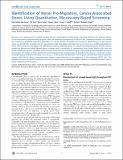| dc.contributor.author | Naffar-Abu-Amara, Suha | |
| dc.contributor.author | Shay, Tal | |
| dc.contributor.author | Galun, Meirav | |
| dc.contributor.author | Cohen, Naomi | |
| dc.contributor.author | Isakoff, Steven Jay | |
| dc.contributor.author | Kam, Zvi | |
| dc.contributor.author | Geiger, Benjamin | |
| dc.date.accessioned | 2011-05-05T16:06:20Z | |
| dc.date.issued | 2008 | |
| dc.identifier.citation | Naffar-Abu-Amara, Suha, Tal Shay, Meirav Galun, Naomi Cohen, Steven J. Isakoff, Zvi Kam, and Benjamin Geiger. 2008. Identification of novel pro-migratory, cancer-associated genes using quantitative, microscopy-based screening. PLoS ONE 3(1): e1457. | en_US |
| dc.identifier.issn | 1932-6203 | en_US |
| dc.identifier.uri | http://nrs.harvard.edu/urn-3:HUL.InstRepos:4882758 | |
| dc.description.abstract | Background: Cell migration is a highly complex process, regulated by multiple genes, signaling pathways and external stimuli. To discover genes or pharmacological agents that can modulate the migratory activity of cells, screening strategies that enable the monitoring of diverse migratory parameters in a large number of samples are necessary. Methodology: In the present study, we describe the development of a quantitative, high-throughput cell migration assay, based on a modified phagokinetic tracks (PKT) procedure, and apply it for identifying novel pro-migratory genes in a cancer-related gene library. In brief, cells are seeded on fibronectin-coated 96-well plates, covered with a monolayer of carboxylated latex beads. Motile cells clear the beads, located along their migratory paths, forming tracks that are visualized using an automated, transmitted-light screening microscope. The tracks are then segmented and characterized by multi-parametric, morphometric analysis, resolving a variety of morphological and kinetic features. Conclusions: In this screen we identified 4 novel genes derived from breast carcinoma related cDNA library, whose over-expression induces major alteration in the migration of the stationary MCF7 cells. This approach can serve for high throughput screening for novel ways to modulate cellular migration in pathological states such as tumor metastasis and invasion. | en_US |
| dc.language.iso | en_US | en_US |
| dc.publisher | Public Library of Science | en_US |
| dc.relation.isversionof | doi:10.1371/journal.pone.0001457 | en_US |
| dc.relation.hasversion | http://www.ncbi.nlm.nih.gov/pmc/articles/PMC2195451/pdf/ | en_US |
| dash.license | LAA | |
| dc.subject | cell biology | en_US |
| dc.subject | cell adhesion | en_US |
| dc.subject | cytoskeleton | en_US |
| dc.subject | gene expression | en_US |
| dc.title | Identification of Novel Pro-Migratory, Cancer-Associated Genes Using Quantitative, Microscopy-Based Screening | en_US |
| dc.type | Journal Article | en_US |
| dc.description.version | Version of Record | en_US |
| dc.relation.journal | PLoS ONE | en_US |
| dash.depositing.author | Isakoff, Steven Jay | |
| dc.date.available | 2011-05-05T16:06:20Z | |
| dash.affiliation.other | HMS^Medicine-Massachusetts General Hospital | en_US |
| dc.identifier.doi | 10.1371/journal.pone.0001457 | * |
| dash.contributor.affiliated | Isakoff, Steven | |


